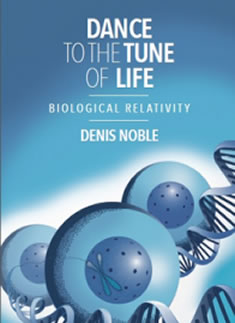
Booksellers
Free article downloads
Launch Lecture
This lecture, given in November 2016 is closely based on that delivered a few days earlier to the New Trends in Evolutionary Biology Meeting at The Royal Society. Towards the end of the lecture he also answers some of his critics. Some had tried to prevent the meeting at The Royal Society from happening.
Reactions to launch lecture
“Naturally magisterial delivery”
“Absolutely superb”
“What a joy it was”
“the lions met a brick wall”
“Wonderful, wonderful, clearly summarized, clearly well-thought-through & substantiated”
Presentation of the Book in Korea in 2019
Editorial Reviews
In this elegantly written and personal book world-renowned physiologist and systems biologist Denis Noble effectively argues for a fundamental revision of the theory of evolution. Against the reductionist, gene-centered approach of Neo-Darwinism, which has dominated biology for more than a century, Noble passionately pleas for a more integrated approach. Massively supported by recent postgenomic and epigenetic empirical research, Dance to the Tune of Life deepens and synthesizes ideas Noble earlier developed in The Music of Life. Biology beyond the Genome (2006) and subsequent writings. Just like Newtonian physics underwent a major transformation in the beginning of the 20th century due to Einstein’s general theory of relativity, the life sciences are facing a no less fundamental transformation. Noble’s book is a must read for anyone who wants to understand this transformation.
Jos de Mul, Erasmus University Rotterdam, Netherlands
Among its many merits, this remarkable book deserves to become a classic text in the philosophy of science. Almost alone among philosophers of science, Noble is a practising scientist; and unusually among practising scientists, he is an accomplished philosopher. His book brings out, with unparalleled clarity, how the scientific endeavour involves not only empirical inquiry but also conceptual structure. Noble shows how, on the negative side, popular presentations of sound biological results may be vitiated by bad metaphysics, and how, on the positive side, science and philosophy may extend the boundaries of knowledge by a unified epistemology. He ends, however, with a salutary warning that there may well be a limit to the human capacity to know the answers to ultimate questions.
Sir Anthony Kenny, University of Oxford
I think this a marvellous book. Denis Noble emphasises that genes, organs and systems dance to the tune of the organism its social and physical environment. He sets the relativity of biology in a remarkable scientific sweep, ranging from cosmology to human belief systems. He reminds me of another great biologist, C.H. Waddington, to whom Noble pays handsome tribute. Writing with clarity and charm, Noble attempts to break down silos of knowledge inhabited by scientists who fail to come out and engage with others. Self-serving priesthoods have never been attractive. Broadening minds in an era of intense specialisation is more important than ever. Noble deserves to be successful in his desire to do just that and I hope that he will be.
Sir Patrick Bateson, University of Cambridge
